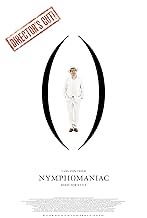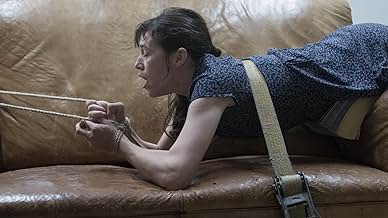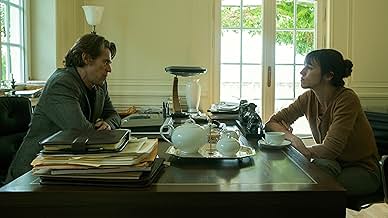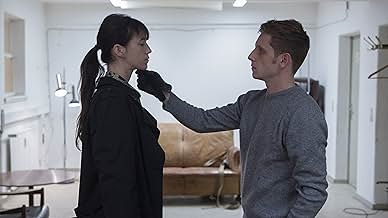जो के यौन रूप से निर्धारित जीवन की निरंतरता उसके वयस्कता के गुप्त पहलुओं को उजागर करती है और जिसके कारण वह सेलिगमैन की देखभाल में था.जो के यौन रूप से निर्धारित जीवन की निरंतरता उसके वयस्कता के गुप्त पहलुओं को उजागर करती है और जिसके कारण वह सेलिगमैन की देखभाल में था.जो के यौन रूप से निर्धारित जीवन की निरंतरता उसके वयस्कता के गुप्त पहलुओं को उजागर करती है और जिसके कारण वह सेलिगमैन की देखभाल में था.
- पुरस्कार
- 14 जीत और कुल 31 नामांकन
फ़ीचर्ड समीक्षाएं
There are still some oddly gripping moments here, but they're more disturbing than ever. Jamie Bell is a real surprise, playing a completely different character to that than you'd expect and doing very well with it too. I'm surprised that I found Charlotte Gainsbourg less sympathetic than the actress playing the younger version of her character. By the time Willem Dafoe enters the frame, the movie seems to have lost its way and become a bizarre, slow-paced thriller instead. And don't get me started on the Mia Goth stuff.
As before, this is a beautifully shot movie with a lot of fragility and artiness contained within its shots. But Lars von Trier can only keep the audience's interest for so long, and by now his tale is beginning to drag, leaving a film that is only so-so rather than profound. And that 'twist' ending is ludicrous more than anything else.
Note: skip this paragraph if you plan to see the movie as a whole, as it reveals some important plot points from the first volume. In this part, Joe (Charlotte Gainsbourg) is still telling her story to Seligman (Stellan Skarsgard), but his role is minor as he mostly listens and doesn't have many witty, maths-related remarks – which I thought was positive, and I liked that Joe asked him how could he possibly be thinking about mathematical formulas while she's talking about sex. My thoughts exactly, but this gets explained, too: Seligman is an asexual virgin. For the sake of drama, could he really have been anything else if not Joe's exact opposite? Also, this part shows us Joe ruining her monogamous life with Jerôme (Shia LaBeouf) because of her addiction, and we can finally see and understand the pain her addiction causes her.
I like to think this part of the movie is more Trier-like: there is less pretentious crap and less oh-so-shocking sex, but more is said about the main character and the story actually goes somewhere (while the first part was mostly about young Joe having sex). Volume II finally tackles the subject of nymphomania as a serious addiction. Just like a junkie, Joe gives up everything for her daily dose, even her loving husband who just can't satisfy her need. And even when she, in one scene, claims she loves herself as she is – a sex addict – it's hard not to smile and feel pity for a person that tries, in every possible way, to justify her behavior, while being aware of the lies she's feeding herself with. Still, I understand why the first part of the movie is lighter and focused on Joe's sexual adventures: every addiction feels awesome at first, just like youth is a much easier life period than all that comes after. Because of this needed transition, it's much better to watch the movie as a whole, if you can manage to sit through its 4 hour entirety.
It was also easier to concentrate on the actors' performances in this part of the movie. Stacy Martin is finally gone, thank God, except for a small part in the beginning that doesn't really show her bad acting. You can now really appreciate Charlotte Gainsbourg as an actress, as she does more than just sit on a bed and talk. Mia Goth is really good as P, even though this is her first role in a movie ever. Willem Dafoe got too little screen time to be really impressive, although he wasn't bad, but Jamie Bell as the sadistic K was great – so naturally intimidating, even his facial expressions make you shiver. There are still some scenes that make you cringe, the pretentiousness isn't completely gone and the movie is tedious from time to time, but I'd suggest you see it, preferably as a whole. It's not perfect, but it's definitely an interesting experience.
Rating: 7/10 Read more at http://passpopcorn.com/
Then Joe is sent to therapy by her gynecologist but she does not admit that she is addicted in sex. Meanwhile Seligman tells to Joe that he is virgin and helps her to understand her actions. Joe believes that Seligman is her friend, but is he?
"Nymphomaniac: Vol. II" is a darker sequel of the volume 1. Joe now is in an adult and her sexual experiences are more perverted and without humor. The conclusion is unexpected and without redemption. My vote is seven.
Title (Brazil): "Ninfomaníaca: Volume 2" ("Nymphomaniac: Volume 2")
The attributes that the general population will view as 'pornography' is the actual gritty realism of the Joe's life - nymphomania. If one has any sympathy for a type of disease or an insatiable need (an addiction), they will come to understand that this movie seems to explore addiction from the perspective of each character. The addictions that shape life as well as the absence of these needs entirely as one character seems to demonstrate - the question that remains in the end is that how far can one woman allowed to take her needs in a male dominated society?
Each character has their own value in the nymphomaniac's life and changes and shapes her personality to what it becomes in the end. I urge you all before writing distasteful reviews that fuel only some type of parental guidance (this is not a movie for kids obviously) or claiming that this film is porn, to actually take the time to see a deeper meaning within the characters and their dialogue even though it is overshadowed with quite a bit of sex...
What's missing most is the interaction between the two lead characters: sex addict Joe and her asexual rescuer Seligman. In the first part, their conversation was like ping pong: they exchanged stories and experiences - hers of a sexual nature, his about all kinds of things. The links and similarities between their seemingly different lives made the film so original and attractive.
In the second part however, it's mostly Joe who tells the stories. Seligman is reduced to a minor part, that of the patient listener. Only at a few occasions he really contributes something to the conversation, but after one of his stories, Joe remarks: 'I think this is one of your weakest digressions'. After that, he lets her do the talking.
Even more than in the first part, Von Trier explores all kinds of (sexual) taboos. There's paedophilia (on which Joe has rather original but very wise views), interracial sex, sado-masochism, and all kinds of humiliation. In between, Von Trier also gives us his unorthodox thoughts on motherhood and feminism.
At several occasions, it's clear how we hear Von Trier speak through the words of his protagonist. There's a nice exchange of arguments about political correctness between Joe and Seligman. He thinks the word Negro shouldn't be used, out of respect for a part of society. She thinks that not allowing the use of certain words, is equal to forbidding certain thoughts. Political correctness is hypocrisy, she thinks. Coming from a man like Von Trier, who has committed his life to the combat against political correctness, this is a clear statement. The same goes for the scene where Joe, after having decided to attend a self help group for sex addicts, accuses the group leader of being a member of some sort of obscenity police. This is a clear message to all narrow-minded people who described 'Nymphomaniac' as porn, before having seen one second of it.
Because Von Trier so clearly has no respect for what society considers decent or proper, I was amazed by Seligmans feminist speech at the end of the film. He comforts Joe by pointing out that her behaviour as a nymphomaniac would probably be applauded if she had been a man. That a woman cannot dedicate her life to limitless sex, is proof of society's double standards. Of course this is true, but it sounds strange after so much scenes in which women are being degraded.
After having seen Nymphomaniac part 1 and part 2, I am really curious about the director's cut. Is it just more explicit sex? I hope not, because showing genitals is clearly not what makes this film great. It's everything else that should make you want to go and see it.
क्या आपको पता है
- ट्रिवियाCharlotte Gainsbourg stated in an interview with the Washington Post that Lars von Trier personally asked her to record a version of the song "Hey Joe" for the end credits after he was unable to secure the rights to Jimi Hendrix's version, something she immediately accepted.
- गूफ़In the director's cut, during the opening of the chapter The Mirror, after Seligman explains that the top of the diamond is called a mirror in some languages and Joe mentions he has a mirror on the wall, you can clearly see the camera and crew members reflected in it. You even see the camera move as it pans right.
- भाव
Joe: Nobody knew his secret. Most probably not even himself. He sat there with his shame. I suppose I sucked him off, is a kind of apology.
Seligman: That's unbelievable!
Joe: Listen to me. This is a man who had succeeded in repressing his own desire, who had never before given into it right up until I forced it out. He had lived a life full of denial and had never hurt a soul. I think that's laudable.
Seligman: No matter how much I try, I can't find anything laudable in pedophilia.
Joe: That's because you think about the, perhaps 5% who actually hurt children. The remaining 95% never live out their fantasies. Think about their suffering. Sexuality is the strongest force in human beings. To be born with a forbidden sexuality must be agonizing. The pedophile who manages to get through life with the shame of his desire, while never acting on it, deserves a bloody medal.
- क्रेज़ी क्रेडिटNear the very end of the credits there is this disclaimer: "None of the professional actors had penetrative sexual intercourse and all such scenes were performed by body doubles."
- इसके अलावा अन्य वर्जनThe director's cut adds roughly 57 minutes of footage, expanding some of the subplots.
- कनेक्शनFeatured in Film '72: 19 फ़रवरी 2014 को प्रसारित एपिसोड (2014)
- साउंडट्रैकThe Little Organ Book: Ich ruf zu Dir, Herr Jesu Christ
Performed by Mads Hock
Written by Johann Sebastian Bach
Arranged by Kristian Eidnes Andersen (as Kristian Selin Eidnes Andersen)
© Zentropa Music
टॉप पसंद
विवरण
- रिलीज़ की तारीख़
- कंट्री ऑफ़ ओरिजिन
- आधिकारिक साइटें
- भाषा
- इस रूप में भी जाना जाता है
- Ninfomanía (vol. 2)
- उत्पादन कंपनियां
- IMDbPro पर और कंपनी क्रेडिट देखें
बॉक्स ऑफ़िस
- US और कनाडा में सकल
- $3,27,167
- US और कनाडा में पहले सप्ताह में कुल कमाई
- $74,978
- 6 अप्रैल 2014
- दुनिया भर में सकल
- $49,34,965
- चलने की अवधि2 घंटे 4 मिनट
- रंग
- पक्ष अनुपात
- 2.35 : 1
इस पेज में योगदान दें





































